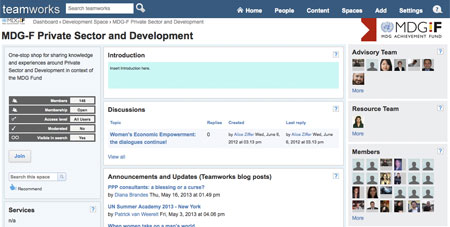A stronger private sector is essential for development. In fact, private sector-led economic growth is considered essential for sustaining any effort to reduce poverty – a core objective of today’s development co-operation – as well as for the supply of infrastructure, services and goods necessary for almost any aspect of the implementation of development policy. However, it has long been recognized that not every development of the private sector necessarily results in the desired broad-based prosperity and equity. It is therefore key that governments and private actors forge effective partnerships that benefit both, the entrepreneurial aspirations of private actors as well as public goals and developmental objectives. This is why, with the eighth MDG-F thematic window, “Development and the Private Sector”, the United Nations and developing country governments sought to facilitate the growth of a vibrant and responsible private sector and new avenues for public-private partnership as means for expediting the achievement of the MDGs.
Under this window, twelve Joint Programmes (JPs) were conceptualized for advancing private sector development (PSD), all of which addressed particular local needs on the countries’ path towards achieving the growth of inclusive markets and pro-poor economic development. In particular, the thematic window advanced PSD practice, policy and impacts through specific economic interventions in the livelihoods of rural populations and vulnerable groups, such as through capacity building and support for the establishment of public-private partnerships (PPPs) and equitable partnerships between small farmers and private sector investors in pro-poor horticulture and agro-industrial value chains.
The MDG-F KM plan for Development and the Private Sector aimed at enhancing the United Nations system’s knowledge capabilities in the field of PSD by improving its institutional readiness for delivering policy advice, institutional capacity-building and pilot projects, particularly at the country level. It also sought to further support developing countries in acquiring and adapting PSD-relevant knowledge to their specific contexts and development needs. In order to achieve the envisioned outcomes, the project focused on: the development of a global KM system for PSD that would facilitate the creation of practical knowledge based on PSD programme experiences; the organization of explicit, existing data and the formalization of tacit knowledge, particularly at the country level; and accessibility to and dissemination of knowledge related to PSD programmes and policies at all levels.
Experiences exchange initiatives:
-
Teamworks: creation of a global Community of Practice and learning partnership. Set up and maintenance of a Teamworks space involving JP teams at UN agencies and national counterparts, as well as external PSD practitioners. Good practices were uploaded and discussions facilitated.
 » mdgf.unteamworks.org/node/16951
» mdgf.unteamworks.org/node/16951
-
Workshops: A global workshop which took place in Panama City in 2011 was aimed at strengthening JP capacity through knowledge sharing and networking, identifying JP knowledge needs, and setting action items to address existing implementation challenges. A closing workshop was held in 2013 to discuss JP results and strategies for sustainability and impact.
-
Webinars: Two webinars took place, one for the Latin America region and another for Asia, Africa and East Europe. The virtual-meeting was designed for the respective JPCs to follow-up on the initial questionnaire sent out for inputs to the MDG-F report on lessons learned and best practices. Its primary purpose was to augment the report by additional complementary inputs from the JPCs of the DPS thematic window. It also provided an opportunity for JPCs to discourse the details and insights of their respective programmes amongst coordinators from other programmes, and to further facilitate the dissemination of knowledge, enabling future joint programmes to capitalize on these experiences.
Studies:
-
Baseline study ‘Networks for Prosperity: Achieving Development Goals through Knowledge Sharing’: In 2011, a baseline study was conducted in MDG-F JP countries as well as regional institutions and select other PSD programme countries. It was developed in partnership with the Leuven Centre for Global Governance Studies. This report discusses the significance of knowledge networks in economic policy and private sector development and points to the important potential benefits of networks for the creation of knowledge.
Launches were held in Vienna, Brussels, Busan, New York, Washington, and San Juan to present the findings of the report. In follow-up, at the 14th session of the General Conference in December 2011, UNIDO Member States adopted resolution GC.14/Res.2 “Knowledge networking and knowledge sharing for achieving development goals”. In this resolution, Member States request the further development of global, regional and local knowledge networking capacities and related governance structures.
-
‘Networks for Prosperity: connecting development knowledge beyond 2015’: A second part of the report was published in November 2013 in cooperation with the Leuven Centre. This report features case studies by select experts on the design and governance of successful knowledge networks with a specific focus on south and triangular cooperation.
Capacity building:
-
Experts Group Meeting on Knowledge Networks and Networks Governance: Held in September 2012 with the participation of 13 notable experts to present their respective academic papers on the subject.
-
Briefings to Member States of the 12 JP countries and Spain (four in 2011-2012).
-
Bilateral meetings and informative sessions to inform stakeholders about the findings emerging from the PSD plan.
Lessons Learned Report: This report aimed to provide an overview and useful analysis of the MDG-F Development and Private Sector window, and constituted a valuable opportunity for information and experience sharing among UN agencies and JPs supported by the MDG-F. Its purpose was to provide knowledge and substantial insights to future interventions in developing countries regarding the design, management and implementation processes of private sector development-related programmes.


